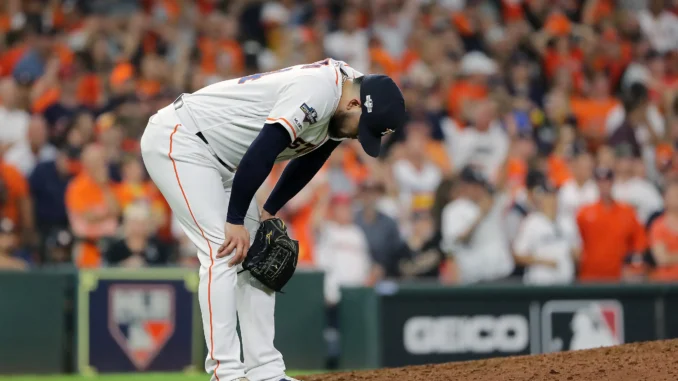
The Stories That the Houston Astros Have Told
Here’s a story: in 2007, a Venezuelan named José Altuve signed a contract with the Houston Astros for fifteen thousand dollars. He wasn’t on anyone’s list of top prospects. Altuve was fast, but he was small—very small, only five feet six (at a stretch). And he couldn’t really hit. For years, he barely ranked among the Astros own best prospects—and the Astros’ minor-league system, back then, was not exactly glittering. In 2012, he finished his first full year in the big leagues, and became an All-Star. That wasn’t saying much—he was an average hitter at best, on a very, very bad team. Near the end of the season, the Astros went 4–34—the worst stretch of any team since 1949. Still, Altuve’s success was a feel-good story. Only that wasn’t the end of it. Over the next season, the Astros organization decided to turn the diminutive Altuve into a power hitter. They came to him armed with data about changing his contact point and the benefit of swinging for fly balls. They taught him a new leg kick. They preached patience. And by the end of the season it worked—remarkably well. He went on to win the batting title and led the majors in hits. By 2017, he was a power hitter batting cleanup, and was named the American League’s Most Valuable Player. During the postseason, he made his mark again and again—sprinting from first base to home on a double to win Game Two of the American League Championship Series against the New York Yankees; hitting a home run against the Los Angeles Dodgers in the tenth inning of Game Two of the World Series; rocketing a three-run homer in Game Five. This year, in Game Six of the A.L.C.S. against the Yankees, he hit a walk-off two-run home run to send the Astros to the World Series.
The reason that this remarkable story exists at all is that the Astros never saw Altuve as a story. If they had, they probably would have concluded that he was overachieving when he reached the major leagues, and never would have pushed him to improve. No one would blame them. “Houston has its very own Little Engine That Could,” Jerry Crasnick wrote, in an ESPN story about the second baseman. (Crasnick also praised Altuve’s “hustle and oversized ticker.”) But the Astros had a new approach, one borrowed from outside of baseball. Already baseball was moving away from the traditional emphasis on experience and relationships, and toward exploiting inefficiencies in the game through analytics. The Astros took that to extremes. Under the new owner, Jim Crane, who made his billions in shipping and logistics, and led by the general manager, Jeff Luhnow, who had spent time prior to working in baseball as a consultant at McKinsey, the team reconstructed its whole approach to building a baseball team. They slashed the payroll and started from scratch. As Ben Lindbergh and Travis Sawchik explain in “The MVP Machine,” they stopped relying on reports from scouts and made a massive investment in data-driven player development. Eventually, they started firing scouts. The problem was that scouts were human. A human eye can’t see the precise way a pitcher’s fingers come off a baseball’s seams, or ascertain the exact exit velocity at which the ball leaves the bat. The other problem with humans is that they are sentimental. They have hidden biases. Their decisions are distorted by loyalty and risk aversion. They have trouble adapting quickly or admitting error. They model the world narratively instead of mathematically, and narratives are always, on some level, subjective. The problem with humans is that they can’t see past their own stories.
The Astros tried to minimize the human element. As Lindbergh and Sawchik write, the team’s front office fired coaches who resisted their techniques and hired coaches they could control. They fired many of their scouts and relied on a group of analysts who studied video and data collected from sensors and cutting-edge cameras. They finely sliced players’ movements, broke their performances down into specialized stats, and tried not to develop relationships with them. They didn’t evaluate players based on the size of their tickers.
Leave a Reply